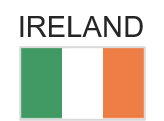The table below aims at gathering the administrative and governmental bodies of Ireland, which are responsible for digital public administration policies and interoperability policies.

National
The overall responsibility for eGovernment/digital policy and the provision of central eGovernment infrastructure and services lies with the Department of Public Expenditure, NDP Delivery and Reform. Particularly, the Office of the Government Chief Information Officer (OGCIO) within the Department of Public Expenditure, NDP Delivery and Reform has overall responsibility for coordinating the implementation of eGovernment policy across the public service in Ireland.

|
Pashcal Donoghue TD Minister for Public Expenditure, NDP Delivery and Reform
Source: http://per.gov.ie/ |
|
Ossian Smyth TD Minister of State at the Department of Public Expenditure and Reform, with responsibility for Public Procurement and eGovernment
Source: http://per.gov.ie/ |
|
Barry Lowry Government Chief Information Officer
Source: http://per.gov.ie/ |
The National Cybersecurity Centre (NCSC) is the operational side of the Department of Environment, Climate and Communications responsible for network and information security. The NCSC encompasses the State's national/governmental Computer Security Incident Response Team (CSIRT-IE). The State works to reduce risks to internet infrastructure and services in the interest of a resilient, secure and trustworthy online environment that citizens and businesses can rely upon for social and economic interaction. The NCSC works with other government Departments, key industries such as energy and telecommunications, and international partners to secure key digital assets and the infrastructure that relies on them.
The organisation of the Civil Registry is distributed in the Republic of Ireland. It is managed by the General Registry Office, under the Department of Social Protection. The birth, death and marriage of a person in Ireland can be registered at any of the 26 local registrar’s offices throughout the country and the General Registry Office located in Roscommon. The information entered in the local registries is then made available through the General Registry, which is the central civil repository for records relating to births, stillbirths, deaths and marriages. Furthermore, relevant information is automatically exchanged, as can be exemplified through the fact that the details of birth registrations are forwarded by the General Registry Office to the Department of Social Protection to automatically generate child benefit claims on behalf of parents.
Similarly, the Vehicle Registry’s organisation is distributed through local Motor Tax Offices, where registrations of purchase, sale, import and vehicle modifications can be made. In this sense, the Vehicle Registry is headed by the Road Safety Authority and operates under the wings of the Department of Transport . As mentioned, registrations are done at any of the 29 local Motor Tax Offices, whose records in turn serve as proof of ownership or proof of any necessary actions undertaken with regards to vehicle registrations. The National Vehicle and Driver File (NVDF) constitutes the national driver and vehicle registries and has its legal basis in Section 60 of the Finance Act 1993.
The Business Registry in Ireland, known as the Companies Registration Office (CRO), is organised in a centralised manner. Its core functions are the incorporation of companies and the registration of business names, the receipt and registration of post incorporation documents, the enforcement of the Companies Act 2014, as well as making information available to the public. The CRO registers only limited companies, thus excluding companies such as sole traders and other types, such as charities. The companies can be registered online, which is now the most used option, in turn allowing for direct processing of the requests at the CRO without having to pass through any decentralised or alternate channels. Furthermore, in line with the CRO’s core functions and the Companies Act 2014, almost all of the information filed is available to the public, usually for a fee.
The Irish Land Registry is operated and maintained by the Property Registration Authority of Ireland (PRA), the statutory body responsible for land registration that also provides information on legislation relevant to property registration. The Irish Land Registry is one of the most advanced in Europe and is fully computerised, with all registered parcels digitised. This, in turn, signifies that any entry or registration in the Land Registry must be done via online channels provided by the PRA and also demonstrates that the Land Registry is coordinated and managed in a centralised way, similarly to the CRO. Additionally, applications for registration are in fact prepared by qualified legal practitioners on behalf of the customer and are then submitted to the PRA for registration.
The Office of the Comptroller and Auditor General is tasked with:
- Auditing and reporting on the accounts of public bodies;
- Establishing that transactions of public bodies are in accordance with the legal authorities governing them and that funds are applied for the purposes intended;
- Providing assurance on the system of internal financial control put in place by each body; and
- Examining whether each body administers its resources economically and efficiently and sets up mechanisms to evaluate the effectiveness of operations.
The Data Protection Commission (DPC) is the national independent authority responsible for upholding the fundamental right of individuals in the EU to have their personal data protected. The DPC is the Irish supervisory authority for the GDPR, and also has functions and powers related to other important regulatory frameworks, including the Irish ePrivacy Regulations (2011) and the EU Law Enforcement Directive.
The main functions of the Information Commissioner are the following:
-
Review the decisions of public bodies in relation to Freedom of Information (FOI) Act requests and, where necessary, make binding, new decisions;
-
Review the operation of the FOI act to ensure that public bodies comply with its provisions;
-
Foster an attitude of openness among public bodies by encouraging the voluntary publication of information above and beyond the minimum requirements of the act; and
-
Prepare and publicise observations on the practical operation of the act.
The Digital Issues Senior Officials’ Group, a sub-group of the Cabinet Committee on Economic Recovery and Investment, which is chaired by the Tánaiste, has been established and meets regularly to oversee implementation of the national digital strategy, Harnessing Digital, and reports on its progress annually. The Group also oversees relevant EU and regulatory issues and input to the national Digital Decade Strategic Roadmap.
The Local Government Management Agency (LGMA) is a State agency of the Department of Housing, Local Government and Heritage. It was established in 2012 to provide a range of services to the local government sector following the merger of the Local Government Computer Services Board, the Local Government Management Services Board and the Library Council (An Comhairle Leabharlanna). The LGMA provides a range of services within the context of its statutory remit, in support of coordinated and cost-effective delivery of local government services and policy.
The Local Government Audit Service (LGAS) is an external audit service providing independent credibility to the financial stewardship function of local authorities and other bodies.

